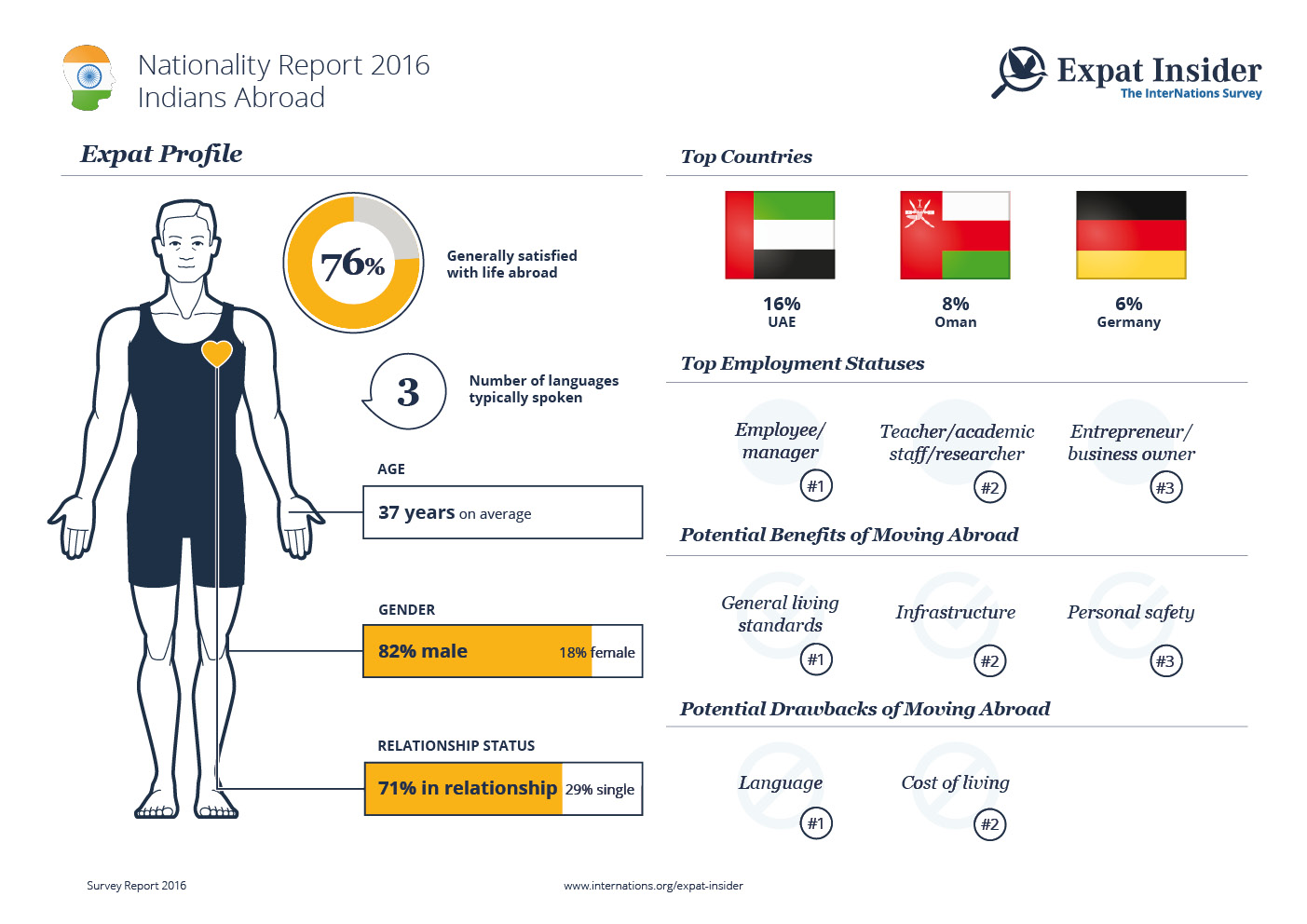Indians Abroad Put Work and Study First
- Indians earn more abroad
- Vast majority of Indian expats are male
- Over a quarter found a job abroad on their own
- A quarter don’t speak the local language at all
- 29% are in a long-distance relationship
Staying Close to Home
Many Indians who live abroad do so just on the other side of the Arabian Sea: almost one-sixth live in the UAE (16%), while 8% live in Oman and a further 5% each in Bahrain, Saudi Arabia, and Qatar. The only Western country in the top five destinations of Indians abroad is Germany with 6%.
Going Abroad for Work and Study
The reasons behind the relocation are mainly work and study related: almost two out of seven Indian expats (28%) say they found a job abroad on their own, 16% were sent by an employer, 9% were recruited by a local company, and 9% moved to go to school or university abroad. Love as the main motivator is much less common than across all respondents (2% vs. 11% worldwide), as is the partner’s job or education (7% vs. 9%).This changes, however, when looking at Indian women only: the female figures show that for 34% of them the number one reason for relocating is the partner’s job or education. It is worth pointing out though that 82% of the Indian respondents who disclosed their gender are male.
Employees, Entrepreneurs, or Stay-at-Home Mothers
Once abroad, around two-thirds work as either employees or managers (65%), while 6% describe themselves as teachers, academic staff, or researchers, and a further 6% are entrepreneurs or business owners. Among Indian women, the largest group with approximately two-fifths (39%) are also employees or managers, while the second-largest group consists of home-makers and stay-at-home mothers (16%).
The Benefit Number One
One of the most important potential benefits of a move abroad is considered to be the general standards of living, regarded as such by 65% of Indian respondents. And thanks to improved incomes, Indian expats can fulfill this wish for a good standard of living: more than five out of seven respondents (72%) say that for the same position in their home country, they would generally earn less. Across all survey respondents, only 54% feel the same.
Above-Average Education Levels
Indian expats also show a high level of education. Indeed, half of the respondents have attained either a postgraduate degree or a Master’s degree, which is nine percentage points more than the global average. A further 37% of the Indian expats have a Bachelor’s degree and one in twenty even has a PhD. Very few have no degree at all (only 1%) or just a high school diploma, the latter of which has been obtained by 4% opposed to the global average of 8%.
Linguistic Talent, but Not for the Local Language(s)
Respondents from India certainly have a flair for languages, seeing as with 36%, the largest group says they speak three languages, and almost two out of seven (28%) speak four, whereas globally the averages are 31% and 19%, respectively. But what is even more striking is that 14% say they speak five languages, 4% speak six, and 2% even seven or more, which is double the global average. It may come as somewhat of a surprise then, that only a third say they speak the local language(s) in their host country generally well, while almost two in five (39%) speak it just a little and 24% not at all.
Indian Partners and Long-Distance Relationships
Five out of seven Indian respondents (71%) are in a relationship. Mostly, their partner is from India as well (86%) and 78% say they met before moving to their current host country. However, two-sevenths (29%) are in a long-distance relationship, which is not quite double the global average of 16%. For 47%, family reasons are the number one reason for doing long distance, including for example considerations regarding their children’s education. This is a significantly higher percentage than the global average of 28%. On the other hand, different career priorities among the partners (11%) and a lack of suitable jobs for both (8%) are far less likely to be quoted by Indian expats than the global average of 20% and 14%, respectively, would suggest.




